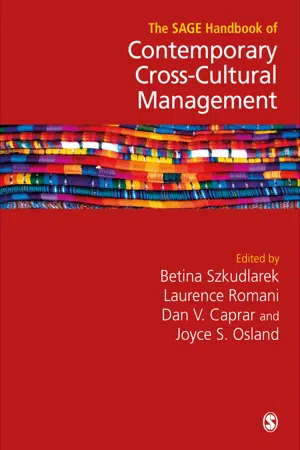
The SAGE Handbook of Contemporary Cross-Cultural Management
- 600 pages
- English
- ePUB (mobile friendly)
- Available on iOS & Android
The SAGE Handbook of Contemporary Cross-Cultural Management
About This Book
This Handbook presents a comprehensive and contemporary compendium of the field of cross-cultural management (CCM). In recognition of current trends regarding migration, political ethnocentrisms and increasing nationalism, the chapters in this volume not only cover the traditional domains of CCM such asexpatriation, global (virtual) teamwork and leadership, but also examine emerging topics such as bi/multi-culturalism, migration, religion and more, all considered from a global perspective. The result is a Handbook that acknowledges and builds on a variety of research traditions (from mainstream to critical), updates existing knowledge in relation to current challenges, and sets the direction for future research and developments, making this an invaluable resource for researchers in the field, and across related areas of international business, management, and intercultural relations.
Part 1: Multiple Research Paradigms for the Study of Culture Part 2: Research Methods in Cross-Cultural Management Part 3: Cross-Cultural Management and Intersecting Fields of Study Part 4: Individuals and Teams in Cross-Cultural Management Part 5: Global mobility and Cross-Cultural Management Part 6: Developing Intercultural Competence
Frequently asked questions
Information
Part I Multiple Research Paradigms for the Study of Culture
1 Culture in Cross-Cultural Management: Its Seminal Contributors from a Positivist Perspective
Introduction
Characteristics of Positivist CCM Research
Table of contents
- Cover
- Half Title
- Editorial Board
- Title Page
- Copyright Page
- Dedication
- Contents
- List of Figures and Tables
- Notes on the Editors and Contributors
- Acknowledgements
- Introduction: Contemporizing the Field of Cross-Cultural Management
- Setting the Stage: Cross-Cultural Interaction – Creating Success in the Twenty-First Century
- Part I Multiple Research Paradigms for the Study of Culture
- 1 Culture in Cross-Cultural Management: Its Seminal Contributors from a Positivist Perspective
- 2 Interpretive Approaches to Culture: What is Interpretive Cross-Cultural Management Research?
- 3 Critical Perspectives on Cross-Cultural Management
- 4 The Concept of Culture in Cross-Cultural Management: Genealogical Considerations
- 5 Reflexive Chapter: On Paradigm Tolerance in Cross-Cultural Management Research
- Part II Research Methods in Cross-Cultural Management
- 6 Survey Methods in Cross-Cultural Management
- 7 Experimental Methods in Cross-Cultural Management
- 8 Ethnography and Cross-Cultural Management
- 9 Methods of Critical Cross-Cultural Management
- 10 The Uneasy Relationship Between the Case Study and Cross-Cultural Management
- 11 Reflexive Chapter: Towards Greater Methodological Awareness and Researcher Reflexivity
- Part III Cross-Cultural Management and Intersecting Fields of Study
- 12 Languages and Cross-Cultural Management
- 13 Cross-Cultural Issues in Knowledge Management: A Multi-Discourse Review
- 14 Global Talent Management
- 15 Ethics in the Context of Cross-Cultural Management
- 16 The Role of Religion in Cross-Cultural Management: Three Perspectives
- 17 Cross-Cultural and Diversity Management Intersecting in Global Diversity Management: Tensions and Opportunities
- 18 Reflexive Chapter: Producing Knowledge on Cross-Cultural Management: Conditions, Connections, Consequences
- Part IV Individuals and Teams in Cross-Cultural Management
- 19 Cross-Cultural Management and Cultural Identity: Past Perspectives and Present Prerequisites
- 20 Culture, Context, and Work Motivation
- 21 Cross-Cultural Management and Intercultural Communication
- 22 The Role of Trust in Cross-Cultural Management
- 23 Cross-Cultural Teamwork
- 24 Cross-Cultural Comparative Leadership Studies: A Critical Look to the Future
- 25 The Birth of a New Field from CCM: Global Leadership
- 26 Reflexive Chapter: Some Thoughts on Cross-Cultural Management Research
- Part V Global Mobility and Cross-Cultural Management
- 27 Global Migration and Cross-Cultural Management: Understanding the Past, Moving Towards the Future
- 28 The Changing Context of Expatriation and its Impact on Cross-Cultural Management
- 29 A ‘Change’ Perspective of Repatriation: Review and Research Recommendations
- 30 Refugees and Cross-Cultural Management Studies
- 31 Reflexive Chapter: The Non-Linear Relationships in Cross-Cultural Management and Global Mobility
- Part VI Multiple Research Paradigms for the Study of Culture
- 32 Conceptualizing Cross-Cultural Management Competence
- 33 Developing Intercultural Competency: With a Focus on Higher Education1
- 34 Cross-Cultural Training: History, Developments, Future Directions
- 35 Reflexive Chapter: Developing Intercultural Management Competencies: The Next Frontier is Inward Bound
- Index